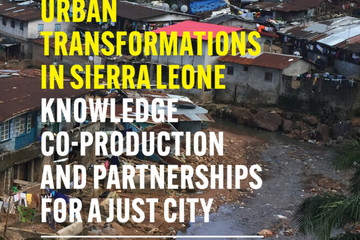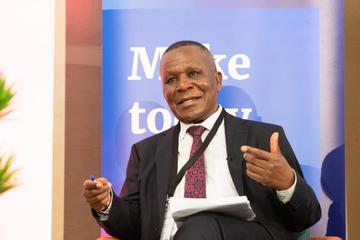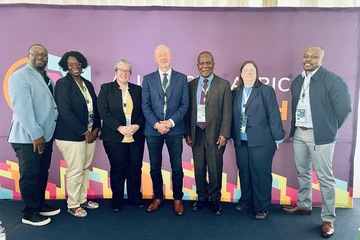Browse
Other
AAP Steps Up Its Global Footprint at Falling Walls 2025
The Alliance for African Partnership (AAP) strengthened its global visibility this year with a significantly expanded presence at the Falling Walls Summit in Berlin, signaling a new phase in Africa’s engagement with one of the world’s leading platforms for science, innovation, and societal impact.
The momentum follows a fast-growing collaboration between AAP and the Falling Walls Foundation, an alliance that has already produced tangible results. LUANAR in Malawi became the first institution in the consortium to launch a combined Falling Walls Engage and Lab, followed by the University of Botswana, which introduced the Gaborone Lab in 2025 and is preparing to roll out the Engage program in 2026. For AAP, these developments are more than individual wins: they mark the beginning of a wider rollout across the consortium, designed to strengthen research communication and create a more connected science engagement ecosystem across Africa.
At this year’s Summit, AAP member universities made their strongest showing yet. Lab winners from LUANAR and the University of Botswana took the stage in Berlin, showcasing African innovation to an international audience of scientists, investors, policymakers, and global media. Senior leaders from across the consortium also attended, led by Michigan State University’s Vice-Provost for International Studies and Programs, Professor Titus Awokuse.
During the delegation meeting with Falling Walls’ Executive Director, Andreas Kosmider, there was clear enthusiasm about the trajectory of the partnership. Discussions focused on deepening African participation in next year’s Summit and widening the circle of collaborators to include government ministries, policymakers, and funding agencies, an effort aimed at opening new channels for African–German cooperation.
For AAP, the stakes are high. Strengthening research communication equips young African scientists to tell their stories compellingly, improving public understanding and increasing the influence of research on policy. The Labs, meanwhile, function as early-stage innovation pipelines, giving African entrepreneurs exposure, mentorship, and a global platform for emerging ideas. The partnership also enhances institutional visibility, positioning African universities as active players in global science diplomacy.
Planning has already begun for next year’s Summit, with AAP leaders working on a coordinated roadmap to ensure a more visible and more diverse African presence in 2026. The goal is not simply to attend, but to shape the agenda by bringing African voices, research, and innovation to the centre of the global conversation.
As AAP expands its Falling Walls footprint, the partnership is beginning to look less like a program and more like an ecosystem-building catalyst. It is strengthening the consortium internally, opening new possibilities externally, and giving African researchers and innovators a much-needed global stage. And if the early signs are anything to go by, the walls separating African science from global visibility are starting to crack, making space for a new era of collaboration and opportunity.
By:
Baboki Gaolaolwe-Major
Thursday, Dec 11, 2025
CULTURE AND SOCIETY
+3

Leave a comment
AAP Connect September 2025 - Editors Note
Dear AAP Members, Stakeholders, Partners and the Public,
Science, technology, and innovation (STI) are crucial to addressing the complex global challenges facing Africa today, including food insecurity, public health crises, climate change, and promoting sustainable economic growth. Harnessing the power of research, new technologies, and innovative solutions is key to building resilient societies, accelerating development, and positioning Africa as a global leader in knowledge-driven transformation.
Alliance for African Partnership (AAP) has identified Science, Technology, and Innovation as one of its key priority areas. This reflects AAP’s commitment to fostering collaborative, cross-disciplinary approaches that empower African researchers, innovators, and institutions to create homegrown solutions. By prioritizing STI, AAP underscores the importance of leveraging African expertise and partnerships to address pressing challenges and to seize new opportunities for inclusive development.
This focus also aligns with the African Union’s Agenda 2063: The Africa We Want, and the Science, Technology and Innovation Strategy for Africa (STISA-2034), which places STI at the heart of Africa’s long-term development blueprint. These policy initiatives emphasize that Africa’s transformation depends on strengthening research and innovation capacity, promoting industrialization, and driving digital and technological advancement. By investing in STI, Africa can ensure it not only responds effectively to emerging crises but also proactively shapes a sustainable, prosperous, and equitable future.
In this way, STI as a priority area of AAP is not only about advancing knowledge—it is about enabling Africa to achieve its aspirations, contribute solutions to global challenges, and unlock the full potential of its people for generations to come. This issue of AAP Connect is dedicated to this priority area and will spotlight researchers, programs, and projects that are advancing STI across the continent.
By:
Jose Jackson-Malete
Tuesday, Sep 23, 2025
OTHER
Leave a comment
Announcing Journal of West African History, Volume 10, Issue 1
Journal of West African History
Announcement Type
Journal
Location
MI, United States
Announcing Journal of West African History, Volume 10, Issue 1
Founding Editor-in-Chief: Nwando AchebeAssociate Editors: Saheed Aderinto, Trevor R. Getz, Toby Green, Vincent Hiribarren, Harry Nii Koney Odamtten. Book Review Editors: Mark Deets, Madina Thiam, Nana Kesse.
Volume 10, Issue I, NOW AVAILABLE!
The Journal of West African History (JWAH) is an interdisciplinary peer-reviewed research journal that publishes the highest quality articles on West African history. Located at the cutting edge of new scholarship on the social, cultural, economic, and political history of West Africa, JWAH fills a representational gap by providing a forum for serious scholarship and debate on women and gender, sexuality, slavery, oral history, popular and public culture, and religion. The editorial board encourages authors to explore a wide range of topical, theoretical, methodological, and empirical perspectives in new and exciting ways. The journal is committed to rigorous thinking and analysis; is international in scope; and offers a critical intervention about knowledge production. Scholarly reviews of current books in the field appear in every issue. JWAH publishes primarily in English but recently published its first French issue. JWAH also plans to publish articles in Portuguese and is experimenting with African-language abstracts in forthcoming issues. JWAH is published by Michigan State University Press.
Editor's Introduction
Nwando Achebe, “Amaechina”
Articles
Cassandra Mark-Thiesen, “Progressive Empire?: Liberian Agriculture, Black American Farming Experts and World War II Engaging Africa and the World”
Emmanuel Asiedu-Acquah, “Engaging Africa and the World”
Caroline Maguire, “Artification and Decolonization at the Musée d’Art Africain de l’IFAN, Dakar”
Sarah Zimmerman, “Legacies of French Colonial Militarization and Gender-Based Violence in the Sahel”
Riina Turtio, “Soviet Military Assistance to Mali and Guinea, 1958-1980”
Book Reviews
Transcripts of the Sacred in Nigeria: Beautiful, Monstrous, Ridiculous (by Nimi Wariboko), Reviewed by Tara Hollies.
State-building and National Militaries in Postcolonial West Africa: Decolonizing the Means of Coercion 1958–1974 (by Riina Turtio), Reviewed by Joe Gazeley.
Letters, Kinship, and Social Mobility in Nigeria (by Olufemi Vaughan), Reviewed by Lisa Lindsay.
Mieux vaut tard que jamais: Sur les traces de six tirailleurs guinéens fusillés à Clamecy en juin 1940 (by Daniel Couriol), Reviewed by Madia Thomson.
Decolonizing Independence: Statecraft in Nigeria's First Republic and Israeli Interventions (by Lynn Schler), reviewed by Rouven Kunstmann.
Submissions
The editorial board invites scholars to submit original article-length manuscripts (not exceeding 10,000 words including endnotes) accompanied by an abstract that summarizes the argument and significance of the work. Review essays should engage the interpretation, meaning, or importance of an author’s argument for a wider scholarly audience. Please contact our Book Review Editors at mark.deets@aucegypt.edu, madina.thiam@nyu.edu, or nkesse@clarku.edu for more information.
Contact Email:jwah@msu.edu
By:
Baboki Gaolaolwe-Major
Wednesday, Jan 15, 2025
CULTURE AND SOCIETY
+1
No Preview Available
Leave a comment
Tackling Urban Challenges in Freetown
With over 1 million residents, Freetown, Sierra Leone’s capital, faces critical challenges in housing, infrastructure, and service provision—issues intensified by climate change. Many residents live in informal settlements; up to 70% of the population works in the informal sector.
In response, the Sierra Leone Urban Research Centre (SLURC) was established in 2015 to address these pressing issues through research, capacity building, and advocacy, focusing on health, land, housing, and mobility. SLURC has become a vital platform for dialogue, bringing together urban stakeholders to shape Freetown’s future.
Urban Transformations in Sierra Leone captures SLURC’s impactful journey, showcasing key findings from diverse research projects and highlighting the power of transdisciplinary collaboration.
Discover how knowledge and partnerships are reshaping Freetown.Download the book for free: https://ow.ly/AivJ50UlstO
By:
Baboki Gaolaolwe-Major
Saturday, Dec 7, 2024
CULTURE AND SOCIETY
+1

Leave a comment
Editor's Note: Richard Mkandawire, AAP Africa Director
Dear AAP Members, Stakeholders, Partners and the Public
I am pleased to present the second issue of AAP Connect, focusing on AAP’s strategic goal of research for impact. In this issue, we use the example of a critical theme that lies at the heart of sustainable agriculture and food security in Africa: soil health, fertilizer usage, and agri-food systems. Our inaugural AAP Connect issue published in April, focused on building sustainable networks in research. We wanted to highlight some of the unorthodox approaches to networking, not just the usual meet, and greet, and exchange contacts, but ones that take into account context and timing. If you missed it, please spare some time and browse through it.
We have just returned from Nairobi, Kenya, where African governments led by their heads of state, global donor organizations, and global policy network organizations met at the Africa Fertilizer and Soil Health Summit, 7th to 9th May 2024. At the summit, stakeholders unveiled Africa’s Fertilizer and Soil Health Action Plan and shed light on the pressing need to invest in this plan’s implementation, emphasizing the crucial role of soil health and fertilizer in enhancing food security and nutrition across the continent. This AAP Connect issue, therefore, comes at a critical period where Africa has gone through a challenging period of fertilizer shortages, and governments and global agencies are poised to take action. This aligns perfectly with AAP’s priority area of Agri-food systems, emphasizing one of AAP’s primary Goal 3: Research for Impact, that targets deliver impactful research that transforms lives.
I am also proud to announce to you that witnessing the summit unfolding was a surreal moment for us at AAP because we have played a pivotal role in its conceptualization. It has taken much effort and a lot of back-and-forth negotiations to make it a reality. We are proud to be the technical partner of this important process that will see transformations in Africa’s agri-food systems. The icing on the cake was that we at AAP, in partnership with ANAPRI and top experts in agriculture and soil health from across our consortium, convened a side event that focused on the role of science, research, and training institutions in the realization of Africa’s Fertilizer and Soil Health Action Plan. During this side event, we discussed at length the critical importance of knowledge creation, training, and collaborative research initiatives in driving sustainable soil health and fertilizer practices to improve food baskets in Africa.
Further cementing our commitment to actionable outcomes, AAP collaborated with Catholic Relief Services and the Government of Malawi to host the Malawi Ready event. This event convened key stakeholders to chart a strategic implementation path for Malawi's adoption of the Africa Fertilizer and Soil Health Action Plan. We were honored to welcome the President of Malawi, Dr Lazarus McCarthy Chakwera and other distinguished government officials, signifying the collective resolve to tackle soil health and fertilizer challenges head-on.
For this issue, as a way to spark your minds with innovative approaches to research for impact, we have enlisted top experts to unpack key issues and bring ideas that may be transformed into solutions for Africa. We hope that you will enjoy and be inspired to work on your next impactful research project in agri-food systems or any other field which has the potential to transform lives in Africa and beyond. Together, we can drive meaningful change and pave the way for a more sustainable and food-secure Africa.
Warm regards,
Richard Mkandawire
AAP Africa Office Director
By:
Baboki Gaolaolwe-Major
Wednesday, Jul 10, 2024
WATER, ENERGY, AND THE ENVIRONMENT
+2

Leave a comment
The Role of Science, Institutions of Learning, and Training on Africa’s Fertilizer and Soil Health.
Summary: African soils are in danger, and this crisis threatens to disrupt food security and ecosystems, potentially leading to famine and nutritional challenges. Healthy soil is essential for human existence on earth. Healthy soils have biological, physical and chemical properties found in their top layer, or topsoil, that sustain plant and animal productivity, soil biodiversity and environmental quality.
Healthy topsoil is a key factor in bolstering agriculture productivity in Africa. Yet it is known that African soils are in a crisis. Addressing this urgent issue requires a collaborative effort involving policy and regulation, funding, private and community interventions, and, crucially, the leadership of African research and training institutions. These entities are pivotal in restoring Africa’s soil health and ensuring the appropriate use of fertilizers.
The Africa Fertilizer and Soil Health Summit (AFSHS), held in Nairobi, sought to address these pressing issues. The Summit’s primary goal was to establish an Africa Fertilizer and Soil Health Action Plan, a roadmap designed to tackle the challenges of declining soil health and low fertilizer efficacy across the continent. This plan, envisioned to guide efforts until 2030, aims to enhance agricultural productivity through sustainable practices and robust policy frameworks.
During the Summit, the Alliance for African Partnership (AAP), in collaboration with Michigan State University (MSU) and the Africa Network of Agricultural Policy Research Institutes (ANAPRI), organized a critical side event. This event underscored the indispensable role that African research and training institutions play in shaping and implementing policy reforms for fertilizer and soil health programs.
The Vital Role of African Research and Training Institutions
African research and training institutions are custodians of knowledge and expertise, uniquely positioned to drive sustainable agricultural practices and to address ongoing soil degradation. Their role in promoting sustainable practices and conducting extensive research is central to the success of the Africa Fertilizer and Soil Health Action Plan. These institutions, including universities, scientific crop and livestock institutes, and policy research think tanks, are essential in providing thought leadership, policy engagement, and the development of key solutions and implementation strategies.
Professor Thom S. Jayne of MSU highlighted this during his keynote presentation at the side event. He emphasized that effective implementation of soil health initiatives requires the involvement of trusted local institutions. “The message coming from established local actors will generate much greater trust and commitment than the same message from externally funded outside interests,” he noted. This sentiment reflects a broader recognition that African-led initiatives are crucial for achieving lasting impact and engagement with African governments.
Challenges and Collaborative Efforts
Implementing these initiatives is not without challenges. African food systems face pressures from climate change, population growth, conflict, and land degradation. Innovation is necessary to adapt to these conditions, and this innovation must be driven by robust agricultural research and extension systems. As Thomas Jayne stated, “Innovation is required for African founding populations to survive and remain competitive and productive in the face of all these changes.”
However, the adoption of innovative soil fertility practices among smallholder farmers remains low. Many farmers struggle to consistently implement practices like crop rotations, intercropping legumes, and recycling organic matter. To address this according to Thom Jayne, there must be strong bi-directional learning systems where farmers benefit from new technologies, and scientists understand and address the barriers to adoption.
Path Forward: Empowering Local Institutions
The need for empowering local African institutions will be key to responding to the call implementation of the actions plans. However the local institutions will need to take into account challenges such as; the need for building national coalitions of stakeholders and defining local level coordination mechanisms as well as resources including human and financial These institutions must be supported to fulfill their mandates, drive research and innovation, and implement policies that reflect the realities and needs of African agriculture on the ground. Professor Titus Awokuse from MSU underscored the importance of these partnerships. “Stakeholders must collaborate and contribute to the success of the action plans, from providing leadership and coordination to investing resources and actively participating in the implementation process,” he said. This collaborative approach ensures that the action plans are not just theoretical but are translated into tangible outcomes that benefit farmers and communities across Africa.
Conclusion
The Africa Fertilizer and Soil Health Summit and its associated events highlighted the critical need for a concerted effort to address soil health and fertilizer use in Africa. By leveraging the expertise and leadership of African research and training institutions, supported by a collaborative network of stakeholders, there is a real opportunity to create a more sustainable and productive agricultural future for the continent. The success of these initiatives will not only restore soil health but also enhance food security and resilience, ensuring a prosperous future for Africa and its people. Inherently, this is not a small feat, given the diverse multistakeholder partnerships, alongside the complex nature of various governments, it requires careful navigation. Titus Awokuse reminded everyone that “even though our conversations may take many forms and go in different directions, we need to always remember it's about the people. It's about families, children and individuals that don't have a voice, therefore in our conversations we need to think carefully on how to leverage our positions of privilege to make their voices heard”
By:
Baboki Gaolaolwe-Major
Wednesday, Jul 10, 2024
HEALTH AND NUTRITION
+2

Leave a comment
AAP Connect Issue 1 - Editor's Note
Editor's Note:
Greetings to our esteemed AAP Consortium members and stakeholders,
It is with immense pleasure and a sense of collective achievement that I introduce the first issue of AAP Connect - a beacon of our concerted efforts in fostering visibility, communication, and engagement across AAP and all stakeholders and partners. Born out of the pivotal Consortium meeting in Abuja, this newsletter is a testament to our shared vision and commitment to elevating AAP’s strategic goals and activities to new heights.
The recent revision of the 2023 AAP Strategic Plan, enthusiastically endorsed by AAP’s consortium member leadership and Advisory Board, marks a significant milestone in our journey and reflects a profound trust and belief in our renewed vision.
Among the noteworthy updates to our strategy is the introduction of Goal 6, emphasizing documentation, learning, and knowledge exchange. This is not merely an addition but a critical pivot towards enhancing our capacity for effective communication, engagement, and collaborative learning. It is a move that promises to strengthen our bonds and elevate our collective impact on research and innovation for Africa.
As we launch this inaugural issue, our focus is on underscoring the importance of building bridges and networks. These networks are not just conduits for sharing information but are the very fabric that supports and propels research and innovation tailored to African needs and contexts.
We are thrilled to share with you the updates and milestones within our consortium, showcasing the dynamic and impactful work being done across our network. This is more than a newsletter; it is a call to action, a platform for engagement, and a testament to the power of unity in driving sustainable development across Africa.
Thank you for being an integral part of this journey. We look forward to continuing to work hand in hand, building on the solid foundation we have laid to realize transformative research and partnership in Africa.
Warm regards,
Amy JamisonEditor, AAP Connect
AAP Co-Director
By:
Justin Rabineau
Friday, Apr 5, 2024
OTHER
Leave a comment
Perceptions of online self- and peer-assessment: accounting students in a large undergraduate cohort
Purpose
Self-assessment (SA) and peer-assessment (PA) are considered useful tools in the development of lifelong learning and reflective skills. The authors implemented a teaching intervention using SA and PA amongst a large cohort of final year undergraduate students. The purpose of this study was to investigate students' perceptions of online SA and PA in order to understand the differences between these perceptions and to allow instructors to adopt differentiated instruction in developing a diverse student group's professional skills.
Design/methodology/approach
The research design adopted a mixed methods approach through the use of surveys that were administered before and after the SA and peer-assessment intervention in a taxation module taught at a large public South African university. Through the use of a series of open and closed questions students' perceptions on SA and peer-assessment were analysed both quantitatively and qualitatively.
Findings
The findings show that student perceptions of SA and peer-assessment differed significantly, where perceptions of SA were more positive than those towards PA. The findings indicate that SA and peer-assessment still present a challenge in an online context for large student cohorts, despite improved tracking, faster feedback and anonymity.
Originality/value
The study contributes to the literature by analysing students' perceptions about SA and peer-assessment in an accounting education context and in an online setting in South Africa.
By:
Teresa Pidduck
Monday, May 30, 2022
OTHER
Leave a comment
Sobering up in South Africa: The Sin Tax Consequences of a Pandemic
In this article, the authors describe how the South African government has responded to the COVID‑19 crisis through fiscal measures, with a particular focus on the alcohol and tobacco prohibitions. Two severe and fairly unique measures implemented by the government were the prohibition of tobacco and the prohibition of alcohol (and related products). These two measures had an impact on the sin taxes received by the fiscus for the duration of the prohibitions but also had less obvious other short‑ and long‑term fiscal impacts, as well as various social, political and legal implications. This article reviews the tobacco and alcohol prohibitions, the responses by commentators and the short‑ and long‑term effects of these prohibitions on the fiscus and the economy, citing a particular need for a renewed focus on the excise duties on these two products.
By:
Teresa Pidduck
Monday, May 30, 2022
OTHER
Leave a comment
'Semantic Gyrations' - When are Naartjies oranges? Beneath the surface of ABSA Bank Limited v CSARS
This case note sets out the facts, issues, judgment — including submissions — and comments and analysis of the Absa case. The analysis of the case unearths a disjointedness between the legislature’s intention and the wording of certain administrative provisions, and criticises the ability of the administrative provisions contained in various tax Acts to work in concert with one another. A review of these administrative provisions by the legislature may be warranted in the light of this case. Furthermore, the judgment could also impact the interpretation and application of similar terms used in the reportable arrangement section of the TAA.The analysis also exposes some causes for concern regarding the interpretation of the GAAR that may undermine its ability to combat tax avoidance and suppress the mischief of taxpayers. Consequently, until possible appeal, this judgment may have far-reaching effects on the GAAR if the precedent set here is followed in other courts.
By:
Teresa Pidduck
Monday, May 30, 2022
OTHER
Leave a comment
Is Liberia Ready for Monetary Union? Exploring the Convergence Criteria for Eco Adoption
This is a policy brief document that I wrote along with my colleagues while working at the Liberian Ministry of Finance and Development and published in an online repository journal.
By:
Joe Greaves
Wednesday, Feb 2, 2022
OTHER

Leave a comment
Modeling with ARIMA-ARCH/GARCH Techniques to Estimate Weekly Exchange Rate of Liberia
This empirical research focused on a weekly exchange rate volatility modeling, where I studied the distribution of the series and recommended to Central Bank authority the behavior pattern of the financial variable.
By:
Joe Greaves
Wednesday, Feb 2, 2022
OTHER



Leave a comment